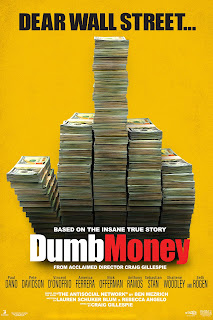Opening in Phoenix today; wide on October 6:
Dumb Money--As with 2015's The Big Short, there were plenty of twists and turns in this movie that my finance-challenged brain had to struggle to keep up with. Also like The Big Short, this chronicle of the weird January 2021 boom in GameStop stock is waggish fun. But it's easier to root for the heroes here, because, as least as this movie tells it, they're ordinary people sticking it to rich hedge fund jerks rather than rich hedge fund jerks sticking it to all of us.
GameStop, a Texas-based video game retailer that had been a mall mainstay since the '80s under one name or another, had been in decline since the rise of online game purchasing. The COVID pandemic seemed like the death knell for the company, and hedge fund short sellers were moving in.
Dumb Money's focus is on Keith Gill (Paul Dano), a small-potatoes analyst and broker from Brockton, Massachusetts. Gill had a day gig at MassMutual but spent his evenings in his basement making funny YouTube videos on investing, and posting on other social platforms that I don't understand. He believed that GameStop stock was undervalued, and his enthusiasm helped to cause an explosion in its price that made the short sellers sweat.
But the "dumb money"--apparently that's what hedge fund folk call individual small investors--was sweating too, of course. The movie, directed by Cruella's Craig Gillespie from a script by Lauren Schuker Blum and Rebecca Angelo (based on Ben Mezrich's's book The Antisocial Network), jumps around among a variety of GameStop investors who were riding the wave with Gill, and resisting the temptation to sell as a matter of economic principle, to the horror and bafflement of their families and friends. These include America Ferrera as a struggling Pittsburgh hospital worker and single mom; Talia Ryder and Myha'la Herrold as Texas college students besotted both with the investment and with each other, and Anthony Ramos as a GameStop employee who buys in.
I presume that some or all of these people are fictional "composites" representing the online rabble who collaborated on the short squeeze. They're nicely played and sympathetic. The millionaire and billionaire vultures are based on real players: Seth Rogen as Gabe Plotkin and Nick Offerman as Ken Griffin and Sebastian Shaw as Robinhood's Vlad Tenev and Vincent D'Onofrio, extra-creepy, as Steve Cohen. A scurvier bunch of parasitical cruds you'd have a hard time finding. Shailene Woodley is touching as Keith's supportive wife, Kate Burton and Clancy Brown are believable as his parents, and Pete Davidson is a perfect fit as the idiot brother.
Driven forward by a lot of stately, foul-mouthed hip-hop on the soundtrack and tricked out with split-screens and montages, Dumb Money cruises along absorbingly and, despite copious comedy, with an ambiguous tension--I wanted to see the hedge fund guys squirm, but I was anxious for the everyday people when they didn't sell. They, after all, need the money. The incidental backdrop of COVID adds to the unnerving atmosphere; the masks and empty malls and streets create an almost sci-fi flavor at times. It may be the first pandemic period piece.
Although the GameStop boom had fans as diverse as Elon Musk and AOC, I was never sure, watching this movie, that I wasn't falling for a simplistic interpretation of the events--the little guys banding together to take the big boys, who have rigged the system so only they can win, down a few notches. Is there another side here? I mean, no doubt GameStop was undervalued, but was it really that undervalued? Did this amount to a whimsical, sentiment-based pyramid scheme, even if it was motivated altruistically rather than as a con job?
One of the posters for the film reads "THE TOP 1% THINKS YOU'RE DUMB." No doubt they do, and as far as finance is concerned, in my case they aren't wrong. So if there's another, more negative, legitimately dumb side to this story, I'm not smart enough to see it.
In any case, I'm not prepared to shed a tear for the hedge funds. Despite the hit some of them took, in the end, the well-connected big investors appear to have pulled strings and avoided ruination; the film resigns itself to the game being rigged. But it also suggests that the big boys will think twice before they ignore the dumb money again, and it claims this as a triumph. As the movie presents the story, it's all but impossible not to invest in it--invest emotionally, that is.



No comments:
Post a Comment